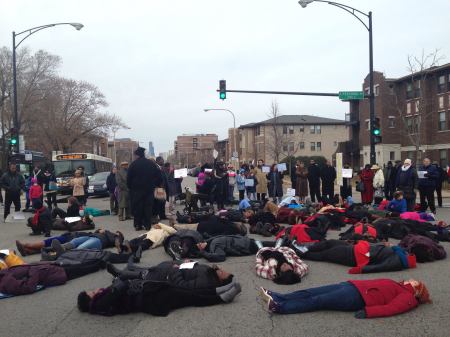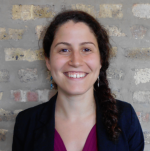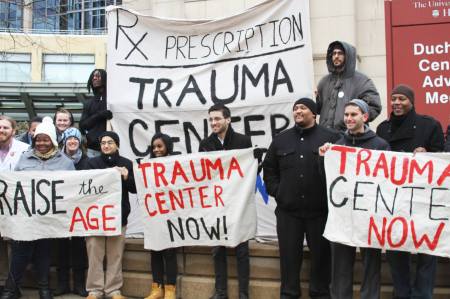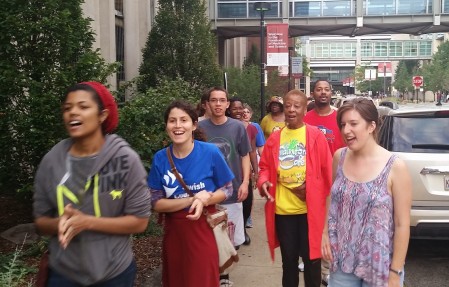By Michal David
JCUA member and guest blogger
‘I can’t breathe’

Activists take part in a die-in in the Bronzeville neighborhood to protest police brutality against people of color.
On Sunday, Dec. 7, I attended a #blacklivesmatter demonstration in downtown Chicago to protest the grand jury decisions in the Michael Brown and Eric Garner cases, and to stand up against a persistent system of police brutality in this country. Like many other protests across the nation over the past few weeks, one of the most powerful phrases chanted by demonstrators was “I can’t breathe.” These were the final words uttered by Eric Garner before he was placed in a choke hold and killed by a New York City police officer in July of this year.

Michal David
While chanting these words, I found myself walking next to an older Black man standing in front of dozens of police officers blocking the march. He was urgently yelling, “But I literally can’t breathe.”
When I asked him to explain, he said: “I go through my life with the feeling that I’m suffocating. That no matter what I do, I can’t do anything right.”
The response left me with a deep sense of despair. How could we even begin to make change in a system that it causes individuals to feel like they are suffocating from severe disenfranchisement? These feelings of helplessness lingered with me as I entered my work week the day following the protest.
Trauma center victory
And then, something wonderful happened. We had a win.
On Tuesday, Dec. 9, the University of Chicago announced that it would begin the process of expanding its pediatric trauma program to include 16- and 17-year-olds. Since the closing of the University’s Level 1 Adult Trauma Center in 1988 and the subsequent closing of the Michael Reese Trauma Center a year later, the South Side of Chicago has been devoid of an adult trauma center. As a result, adults on the South Side who suffer from traumatic injuries are often forced to travel up to 12 miles to receive the care they need.
Join JCUA members in observance of Hanukkah, Thursday, Dec. 18 from 6-8 pm at Grace Place, 637 S. Dearborn. RSVP here.
In the case of serious traumatic injuries, these extra miles can mean the difference between life and death. The potential expansion of services offered at the University of Chicago’s pediatric trauma center would allow access to trauma services for a demographic group that would benefit greatly from such medical care.
The Trauma Center Coalition — led in large part by activists from Fearless Leading by the Youth (FLY) — has been tirelessly fighting for more access to trauma care on the South Side. While the hashtag #blacklivesmatter has gained mass appeal over only the past few months, the Trauma Center Coalition has in fact been touting this important message throughout the last four years of its campaign.
Organizing works
Racial inequity in this country does not only rear its ugly head in instances of police brutality or in the unjust decisions made within our penal system, but also in the choices of powerful institutions such as the University of Chicago in determining who has access to healthcare in this country. By depriving the predominantly Black South Side community of access to immediate trauma care, the University of Chicago is sending the message that Black lives in fact do not matter. This connection between access to healthcare and the devaluation of Black lives was reinforced this past week by medical students across the country staging #whitecoats4blacklives protests.
The announcement by the University of Chicago this past week served as a win not only for the Trauma Center Coalition, but also for the larger movement developing in this country to ensure racial equity throughout all facets of our society. For me, this win was an important reminder that despite the serious injustices in our country, persistence in organizing and advocacy produces important, if gradual, change.
I plan to continue organizing for change by attending JCUA’s Hanukkah Party on Dec. 18. The Hanukkah party will be an opportunity to learn more about getting involved in JCUA’s organizing work, including the Trauma Center Campaign. I hope you join me there so we can continue to together pressure The University of Chicago to open a #TraumaCenterNow, and in turn recognize that Black lives do matter.
Michal is a JCUA member. You can become a JCUA member by registering here.
The JCUA Hanukkah Party will be Thursday, Dec. 18 from 6-8 pm at Grace Place, 637 S. Dearborn. RSVP here.


